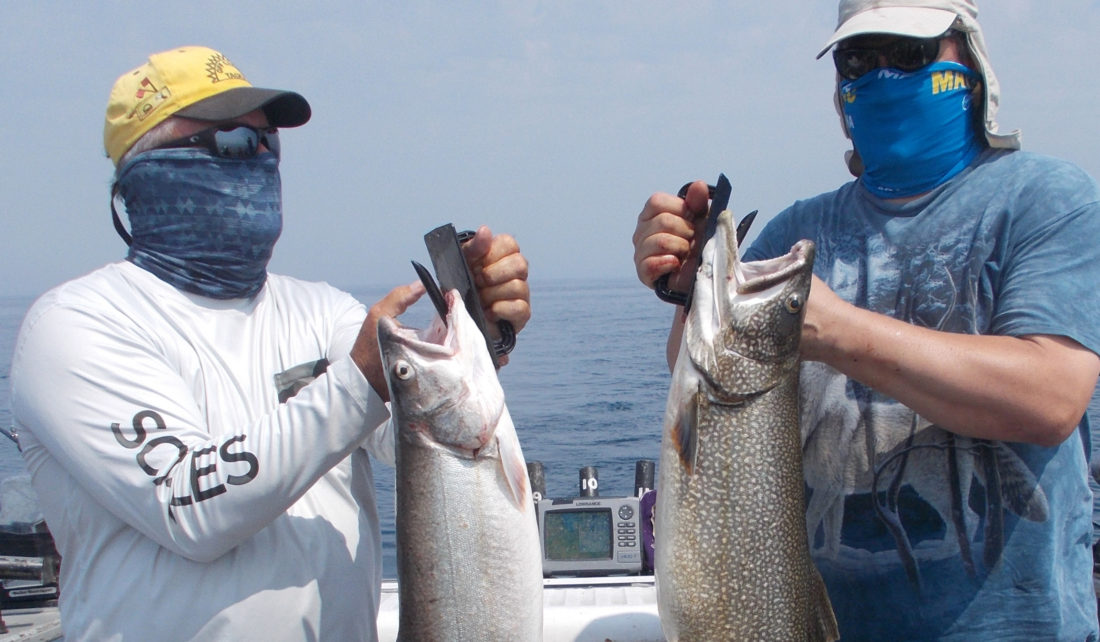
In March of 2020, when the world as we know it quickly shut down due to COVID-19, many Lake Michigan charter captains were just about to kick off the fishing season. While most of these businesses were able to fire up their motorboats later in the summer, on average, Lake Michigan charter operators each lost $20,000 last year. Lake wide, the setback was $9.2 million.
“May is a very busy month in the charter business, and usually helps pay for most of our startup costs,” said David Smith, a charter operator from Gurnee, Illinois. “In 2020, we were way behind the profit level once the marina was opened.”
Add to that, the first round of COVID-19 federal financial support for fishing businesses did not include the Great Lakes.
In the midst of this, Illinois-Indiana Sea Grant set out to provide immediate assistance to charter operators and to help them navigate COVID guidelines. Plus, Mitch Zischke, IISG fisheries specialist, assessed the economic impacts of the pandemic on charter fishing businesses. Funding for this effort was provided by the National Sea Grant Office.
“We quickly built a network of charter boat operators and business owners registered in Illinois and Indiana and provided them regular updates and links to financial aid, a fact sheet, and other resources,” said Zischke. “I was sending out emails, probably once a week, to keep them up to date on how things were changing.”
In June, as restrictions on outdoor activities eased up, many charter captains had questions and concerns about taking anglers out on their boats with COVID still a significant concern. Zischke developed and distributed a publication that provided guidance on best practices for reopening safely, addressing proper cleaning and social distancing, to name a few topics covered.
Zischke also joined with Dan O’Keefe and Titus Seilheimer, his counterparts at Michigan and Wisconsin Sea Grant programs, respectively, to send two surveys to charter boat operators around the lake to get a better understanding of how the pandemic affected their businesses early on and later in the season. In a typical year, the 1,000 Lake Michigan charter fishing businesses engage in about 12,000 trips.
Through June, as many as 37% of charter captains in Illinois and Indiana had not fished at all. Around the lake, captains reported a 50-65% drop in trips, which translates to $5,000–$15,000 loss of income compared to 2019.
“Because the season in the southern Lake Michigan region starts earlier than up north, charter operators in Illinois and Indiana took a bigger hit,” said Zischke.
The second half of the fishing season picked up considerably for charter operators, but lake wide, they each still reported, on average, a loss of just under $3,000 as compared to 2019. Altogether, the total shortfall from June to October was $2 million. Combined with a loss of $7.2 million in the early part of the fishing season, the captains suffered a setback of $9.2 million in 2020 as compared to 2019.
The survey revealed that some captains laid off employees or lowered their rates in 2020 and 35% applied for financial aid. Concerns for the future are considerable.
For example, Smith talked about supply chain problems. “It is hard to get fishing line, rods, reels and other items to make sure the boat is running in tip-top shape. If you don’t have extra parts, which I’ve stocked up this year, you might have issues being able to run charters.”
To help these small business owners be more resilient, Zischke is working with the Purdue Institute for Family Business and the Community Develop Extension team to develop training sessions.
“We’re going to cover how to develop a business plan and contingency plans for when something like a pandemic throw things off track, as well as introduce some digital tools that they can incorporate into their charter fishing businesses, like electronic payments, search engine optimization and social media,” said Zischke.
He plans to share these educational opportunities with southern Lake Michigan charter captains this winter.
Illinois-Indiana Sea Grant is a part of University of Illinois Extension and Purdue Extension.
Writer: Irene Miles
Contact: Mitch Zischke

